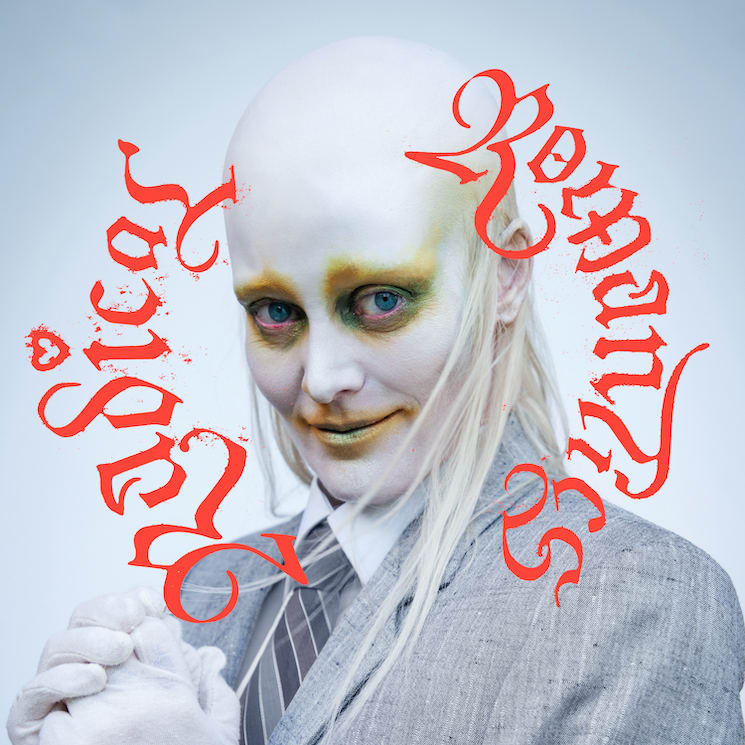"I just wanna be touched / I just wanna shiver"; in two lines, Karin Dreijer more or less sums up the driving force behind their horny, tender and electrifying second act as Fever Ray, one that was jump started by the live-wire sexuality and queer utopian ideals of 2017's Plunge.
"Shiver'' is near-onomatopoeia — a wiggling, skin-prickling treatise on sparring seduction that finds the elder Dreijer sibling reunite with their brother on production duties. The duo twirl strands of writhing synths and keening wails around Dreijer's declarations that "some girls you wanna thrust / Some girls you wanna see shiver"; the context is hot, heavy and obvious, but the subtext is softer, more searching. A phrase as simple as "I just wanna be touched" is a layer cake in Fever Ray's universe of stimulation, a request for understanding and inspiration as much as it is for fingers and tongues.
These soft, jammy layers are what most set Radical Romantics, Dreijer's third full-length as Fever Ray in 14 years, apart from its more kinetic predecessor. Where Plunge was a freefall — sweat-drenched, spit-splattered and ferocious, it dove headlong into the euphoria and ripe anger that accompanied Dreijer's unfurling sexual and gender journey — Radical Romantics is the landing, a parachute-softened arrival on new ground.
That's not to say that Fever Ray has gone easy listening; while less aggressive and dance-focused than Plunge, Radical Romantics is as joyfully alive with sound as anything that Dreijer has created in their three decades of music making. The album's first four songs (all collaborations with Olof Dreijer) act like some lost EP from the Knife, a glimpse into what the duo's music might sound like had they carried on after 2013's thunderous swan song Shaking the Habitual. Lead single "What They Call Us" is a series of elastic tremors, it's refrain — "Did you hear what they call us? / Did you hear what they said?" — carrying a terrifying depth of black in the face of rapidly metastasizing anti-LGBTQIA+ movements across the globe. "Shiver" shakes off some of the weight before "New Utensils" conjures a sort of end-times escape plan, a glance at the uncertain horizon over fuzzy bass surges and prickling synth stabs.
It's on the fluid, calypso-twisted dance song "Kandy" that the Dreijers' past work as the Knife comes rushing over them like waves, carrying their impish early-2000s tropicalia into the future. It's also perhaps most indicative of Radical Romantic's newfound vantage on love and sex. There are shades of unease in its slippery arrangement, but above all else it feels settled and sweet, an open-hearted ode to an indefinable love; "What if I die with this song inside," Dreijer sings, refusing to let their devotion wither in the darkness of their throat.
The practice of speaking-as-freedom is also how you get "Even It Out," the most petulant and violent song on Radical Romantics and perhaps its highest high. Over a curdled bullhorn synth, clanging industrial guitars and a pointillist march of drums co-produced by Trent Reznor and Atticus Ross, Dreijer spins a revenge fantasy against their child's highschool bully; "This is for Zacharias!" Dreijer proclaims, "there's no room for you / And we know where you live."
The song is both terrifying and hilarious, thrilling immediately for the simple fact of its newness — have you ever heard a parent threaten to torture and kill a high schooler in song? "I do things methodically," Dreijer threatens, and while the song is unnerving in its directness and bloodlust, its mania balloons to grander proportions the more time you spend with it. "In this case, there were super sexist and very transphobic things going on at the school," Dreijer told Sasha Geffen in an interview for Pitchfork. "There were a lot of grown-up people around who didn't take any responsibility and didn't protect my kid in this situation" — the story has a maddeningly familiar ring to it, and the wild-eyed revenge of "Even It Out" feels radical at a time when more and more queer kids are told to erase themselves or die; it turns out vulnerability can sound a lot like rage.
It can also sound like this: "What if I told you / In the whole wide world / There is no place I'd rather be / Than with you." The simmering comedown that follows the aurora borealis majesty of "Carbon Dioxide," "North" is the most nakedly romantic song that Karin Dreijer has ever crafted. Another Reznor/Ross cut, it finds Dreijer dragging themselves northward across cracked earth, driven solely by the glow of love in their chest.
The album closes on the wordless "Bottom of the Ocean," a spell cast from the deep. Seven minutes of cavernous synth scrapes and patient vocal bubbles, the song bids goodbye to all of the questioning and shivering and push and pull that preceded it and finds its creator in cool, gentle waters — here is Dreijer, feet in the muck and peering up at the surface, waiting for the light that breaks through the waves.
(Mute)"Shiver'' is near-onomatopoeia — a wiggling, skin-prickling treatise on sparring seduction that finds the elder Dreijer sibling reunite with their brother on production duties. The duo twirl strands of writhing synths and keening wails around Dreijer's declarations that "some girls you wanna thrust / Some girls you wanna see shiver"; the context is hot, heavy and obvious, but the subtext is softer, more searching. A phrase as simple as "I just wanna be touched" is a layer cake in Fever Ray's universe of stimulation, a request for understanding and inspiration as much as it is for fingers and tongues.
These soft, jammy layers are what most set Radical Romantics, Dreijer's third full-length as Fever Ray in 14 years, apart from its more kinetic predecessor. Where Plunge was a freefall — sweat-drenched, spit-splattered and ferocious, it dove headlong into the euphoria and ripe anger that accompanied Dreijer's unfurling sexual and gender journey — Radical Romantics is the landing, a parachute-softened arrival on new ground.
That's not to say that Fever Ray has gone easy listening; while less aggressive and dance-focused than Plunge, Radical Romantics is as joyfully alive with sound as anything that Dreijer has created in their three decades of music making. The album's first four songs (all collaborations with Olof Dreijer) act like some lost EP from the Knife, a glimpse into what the duo's music might sound like had they carried on after 2013's thunderous swan song Shaking the Habitual. Lead single "What They Call Us" is a series of elastic tremors, it's refrain — "Did you hear what they call us? / Did you hear what they said?" — carrying a terrifying depth of black in the face of rapidly metastasizing anti-LGBTQIA+ movements across the globe. "Shiver" shakes off some of the weight before "New Utensils" conjures a sort of end-times escape plan, a glance at the uncertain horizon over fuzzy bass surges and prickling synth stabs.
It's on the fluid, calypso-twisted dance song "Kandy" that the Dreijers' past work as the Knife comes rushing over them like waves, carrying their impish early-2000s tropicalia into the future. It's also perhaps most indicative of Radical Romantic's newfound vantage on love and sex. There are shades of unease in its slippery arrangement, but above all else it feels settled and sweet, an open-hearted ode to an indefinable love; "What if I die with this song inside," Dreijer sings, refusing to let their devotion wither in the darkness of their throat.
The practice of speaking-as-freedom is also how you get "Even It Out," the most petulant and violent song on Radical Romantics and perhaps its highest high. Over a curdled bullhorn synth, clanging industrial guitars and a pointillist march of drums co-produced by Trent Reznor and Atticus Ross, Dreijer spins a revenge fantasy against their child's highschool bully; "This is for Zacharias!" Dreijer proclaims, "there's no room for you / And we know where you live."
The song is both terrifying and hilarious, thrilling immediately for the simple fact of its newness — have you ever heard a parent threaten to torture and kill a high schooler in song? "I do things methodically," Dreijer threatens, and while the song is unnerving in its directness and bloodlust, its mania balloons to grander proportions the more time you spend with it. "In this case, there were super sexist and very transphobic things going on at the school," Dreijer told Sasha Geffen in an interview for Pitchfork. "There were a lot of grown-up people around who didn't take any responsibility and didn't protect my kid in this situation" — the story has a maddeningly familiar ring to it, and the wild-eyed revenge of "Even It Out" feels radical at a time when more and more queer kids are told to erase themselves or die; it turns out vulnerability can sound a lot like rage.
It can also sound like this: "What if I told you / In the whole wide world / There is no place I'd rather be / Than with you." The simmering comedown that follows the aurora borealis majesty of "Carbon Dioxide," "North" is the most nakedly romantic song that Karin Dreijer has ever crafted. Another Reznor/Ross cut, it finds Dreijer dragging themselves northward across cracked earth, driven solely by the glow of love in their chest.
The album closes on the wordless "Bottom of the Ocean," a spell cast from the deep. Seven minutes of cavernous synth scrapes and patient vocal bubbles, the song bids goodbye to all of the questioning and shivering and push and pull that preceded it and finds its creator in cool, gentle waters — here is Dreijer, feet in the muck and peering up at the surface, waiting for the light that breaks through the waves.




